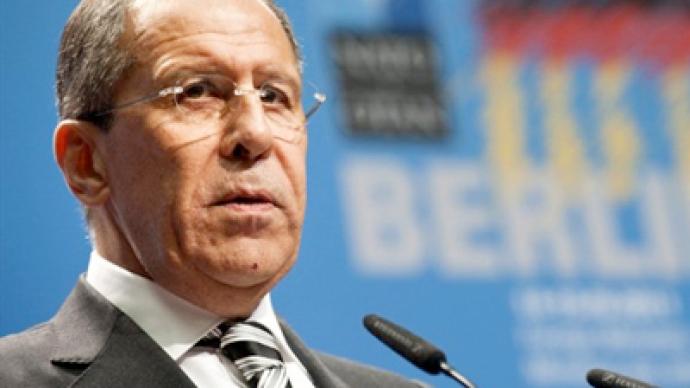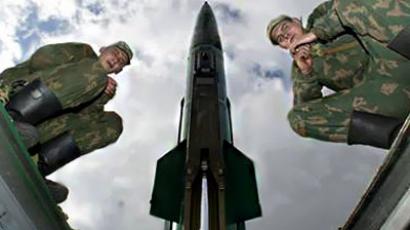No UN mandate for Libyan ground operations, regime change – Lavrov

Russian Foreign Minister Sergey Lavrov has said that the UN Security Council Resolution 1973 does not provide a mandate for ground operations in Libya, nor should NATO be aiming for a regime change.
NATO ministers, who are holding a two-day meeting in Berlin, have their plate full over the Libyan crisis, which has created a deep fissure in the western military bloc over military strategy. Meanwhile, the implementation of a European missile defense system, which Moscow says should be a joint venture between Russia and NATO, also ranks high on the agenda.Addressing a news conference on Friday, Lavrov expressed concern that NATO was exceeding its UN mandate."Today we see actions that in a number of cases go beyond the framework drawn by the UN Security Council,” he said. “There is talk already that Resolution 1973 can even be used for a ground operation. However, the resolution does not imply such actions. The Security Council has not authorized such actions.”
Watch Sergey Lavrov's full speech
Russia, together with Brazil, China, India, and Germany, abstained from voting on the UN Security Council resolution authorizing the use of force in Libya and the implementation of a no-fly zone over the country. NATO forces, made up primarily from France, Britain and the US are now tasked with protecting civilians in Libya, although Russia says regime change may be on the cards.Lavrov stressed that the Security Council itself – not Russia – is fully responsiblefor political control over the implementation of the resolution. "The UN Security Council itself plays the role of a watchdog of the implementation of resolutions that it passes,” the Russian foreign minister said. “The UN Security Council should, and will, exercise political leadership over all actions that are planned in its resolutions and political control over these actions, not spilling beyond the framework of the objectives stated in these resolutions.”Lavrov added that NATO should restrain itself from attempting “regime change” against Libyan leader Muammar Gaddafi.Yet that seems to be exactly what the NATO coalition seems to be pursuing. What started out as a mission to “protect civilians and enforce a no-fly zone,” has transformed into an effort to depose of a leader without having a clear understanding as to the nature of the rebel opposition. UK Prime Minister David Cameron, French President Nicolas Sarkozy and US President Barack Obama signed their own self-styled resolution published simultaneously in three daily newspapers, The Times of London, Le Figaro of France, and the United States' Washington Post saying Al Qathafi must "go and go for good." "So long as Gaddafi is in power, NATO and its coalition partners must maintain their operations so that civilians remain protected and the pressure on the regime builds,” the three leaders wrote … “Britain, France and the United States will not rest until the UN security council resolutions have been implemented and the Libyan people can choose their own future."Meanwhile, Lavrov called intelligence reports that al-Qaeda may be attempting to take advantage of the uprising “disturbing.”The Russian foreign minister said in order for the situation in Libya to normalize, it is essential to use diplomatic measures."We believe that it is extremely important to put the situation onto a political track and switch to political-diplomatic methods in settling the problem as urgently as possible," Lavrov said."It is more useful in determining what that future would be, not by making external ultimatums, but by encouraging all those who want a new Libya to sit at the negotiating table and seek an agreement, instead of chasing each other with heavy and other various armaments in a bid to inflict losses on the enemy, and when a tremendous number of civilians are in danger and getting killed in the course of this process," he said.Lavrov also touched upon another issue of crucial importance within the Russia-NATO framework, and that is Euro missile defense, which Moscow says will exist as a threat to its national security unless Russia is brought on board the project at all levels of interoperability.Otherwise, Russia will seek guarantees that the system cannot compromise Russia’s defenses. "How to further act on the issue [of building a missile defense] is a matter that should be referred to military professionals,” Lavrov said. “They will have to agree on technical, geographic and other parameters that will guarantee, in the legal sense, the fact that no component of the future missile defense system would be targeted at any member of the Russia-NATO Council.”It is essential "to begin talks by coordinating the concept and architecture of the future system proceeding from the risks that exist in the sphere of missile proliferation," he said.Russia envisions “totally different world” with joint missile defenseMoscow says the mutual development and operation of a European missile defense system would benefit bilateral relations, while also telling Europe it cannot afford to be a passive spectator to the debate."If we manage to reach agreement on the project of equitable access to the European antiballistic missile defense system, we'll live in a totally different world then," Russian ambassador to NATO, Dmitry Rogozin told reporters on Thursday at a meeting organized by Germany's Society for Foreign Affairs.Arguing that Russia and Europe are suffering from “a deficit of common business and common capital,” Rogozin said that the implementation of a common defense system would not only promote the security of the entire European continent, but would work to remove age-old suspicions."We need capitalization of our relations and the European missile defense project gives us a chance in this sphere," Rogozin said.Russia and NATO formally agreed to cooperate on the Euro missile defense system during the November 2010 Russia-NATO Council summit in Lisbon, where Russian President Dmitry Medvedev was special guest. NATO command wants there to be two independent systems that exchange information, while Russia, arguing that such a sophisticated system with potential to increase further on its doorstep, is pushing for a joint system with full-scale interoperability.The stakes in this debate are high, but perhaps highest of all for Europe, which could find itself in the middle of yet another arms race. Therefore, Rogozin warns, Europe cannot remain a “passive observer” of the talks that will have an impact on European-Russian relations for many years to come. Missile defense needs some “wise-men” inputRogozin, therefore, is calling for the creation of discussion panels made up of European and Russian defense experts – “wise men, as he calls them – to give in-depth consideration to the implications of missile defense for the region. "Some European skeptics say Europe is a passive observer in the Russian-US talks on the issue,” Russia’s NATO envoy said. “I would like to propose setting up some kind of a public and expert movement for successful implementation of this joint project.” "I suggest you think of setting up a group of European ‘wise men’ to support official talks, first between the US and Russia, and then between Russia and NATO, with their discussions and new initiatives," Rogozin added."Our American colleagues have similar technologies. The Europeans do not have them. But as the talk is about the European continent, we believe…the Europeans have to think themselves and be responsible for their own security. “Europe cannot be an observer to the creation and deployment of weapons on its territory," Rogozin said.The Russian NATO envoy said Russia is ready to get on board the program under one condition: "We need strict legal guarantees that the system will not target Russian strategic deterrence potential. That is our national interest, which we cannot put in doubt. We cannot risk our national interests and sovereignty guarantees.” He also called on his Western colleagues to see Russia as a partner, not as a potential enemy."Missile defense should be smart, it should be proportionate to real danger," he said.Meanwhile, Russia would also oppose any plans for a missile shield in the north of Europe, since any potential missile threat can come only originate from the south."We believe there should be no (missile defense) systems, weapons or information means first and foremost in the Baltic-Kaliningrad region,” Rogozin told reporters in the German capital. “There is nothing to fear there, there is no potential adversary and no military infrastructure shall be deployed there that would only create new threats."We believe it is absurd to claim that potential future missile challenges may target Europe from all directions. Nobody is threatening Europe even theoretically from the Atlantic Ocean and from the north the only threat are polar bears," Rogozin added.Robert Bridge, RT














